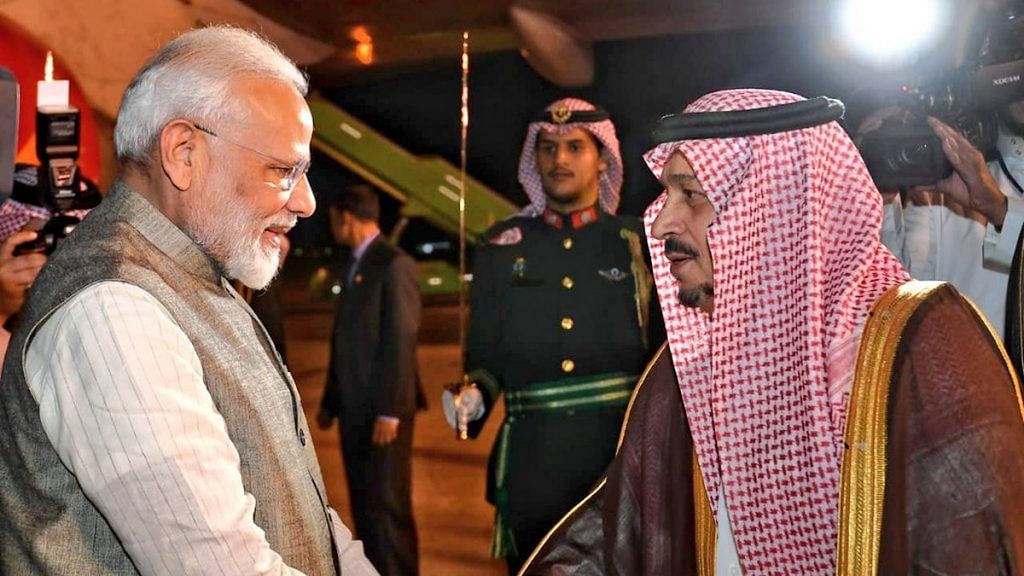Two days before Jammu & Kashmir is downgraded and bifurcated into two Union Territories on 31 October, as many as 28 Members of the European Parliament are travelling to Srinagar to check the situation on the ground.
By the time the Members of the European Parliament (MEPs) fly into the Kashmir valley, Prime Minister Narendra Modi would have reached Riyadh to participate in the third Future Investment Initiative (FII) and meet both King Salman as well as Saudi Crown Prince Mohammad bin Salman, or MBS as he is popularly known.
And in another two weeks, Chief Justice Ranjan Gogoi is set to deliver the verdict on the most complex Hindu-Muslim land dispute in contemporary India – the land on which once stood the Babri Masjid and where Hindu groups now want to build the Ram Mandir.
All the three issues are connected to India’s largest minority, the Muslims, and how the Modi government is employing outside influencers to help change the perception within.
Also read: World won’t buy Modi’s high-profile diplomacy if he sends far-Right EU members to Kashmir
2019 is not 1992
The PM knows that it will be important to have the Saudis on his side – in dealing with the evolving situation in Kashmir as well as with the fallout of the Babri Masjid-Ram Mandir verdict.
Certainly, 2019 is a far cry from 1992 when the Babri Masjid was demolished, and the demolition got tied up with India’s handling of the insurgency in Kashmir.
At that time too, Pakistan had led the charge to internationalise the Kashmir issue and succeeded to a great extent.
In 2019, Modi has both political strength as well as charisma on his side. Despite the fact there is no opposition to speak of at home, he is taking no chances. He already has a relationship with the Saudis. This visit to Riyadh is no accident.
Modi knows that Pakistan Prime Minister Imran Khan’s sliding economy is being bailed out by the Saudis, most recently with a $3 billion cheque. MBS and his father, King Salman, moreover, routinely employ retired Pakistani army chiefs to head their armies – General Raheel Sharif, who preceded the current Pakistan Army chief General Qamar Javed Bajwa, is the head of the 41-nation Islamic military counter-terrorism coalition, which is based in Riyadh.
Modi also shares a very close relationship with the Crown Prince of Abu Dhabi, Sheikh Mohammed bin Zayed Al Nahyan, popularly known as MBZ. What is less well-known but is a very important part of this complex equation is MBS’ very close relationship with MBZ.
The UAE Sheikh was instrumental in awarding Modi the Order of Zayed, its highest civilian award in late August. According to the latest figures from the UN’s International Organization for Migration, there as many as 3.4 million (or 34 lakh) Indians living in the Emirates today, while the figure for Pakistanis has dropped to nearly a million (10 lakh approx.) now.
Why has this happened? Emirati sources say the UAE is increasingly uncomfortable with Pakistan’s linkages with terror and terrorism – especially after 9/11 and the discovery of Osama bin Laden’s hideout in Abbottabad, within spitting distance of the Pakistan army training institute in 2011.
Remember the special invitation to former external affairs minister Sushma Swaraj at the Organisation of Islamic Cooperation (OIC) ministerial meeting in Abu Dhabi in March? It provoked her Pakistani counterpart, Shah Mehmood Qureshi, to say that he would not even attend the event.
Pakistan’s loss was India’s gain.
Also read: How foreign media coverage of Kashmir crisis has become a headache for Modi govt
Exchanging notes on Kashmir
And now it seems the PM’s visit to Saudi Arabia to meet the powerful Crown Prince has been made possible by none other than MBZ.
The Kashmir issue is not formally on the agenda, but it is a matter that both sides will talk about. Modi will likely explain the reasons behind dilution of Article 370 and how security forces have since kept peace. He will point out that despite the lockdown – or because of it – there has been very little violence in the Valley.
Modi’s plan is to demonstrate that the decision to scrap Jammu & Kashmir’s special status is irrevocable. Both the UAE and Saudis understand the need to employ tough measures – neither are particularly democratic nations. Certainly, both Arab rulers will be helpful in mitigating any of the diplomatic stress that Modi’s Kashmir decision may have generated.
For the time being, US President Donald Trump is on board – he is a key Saudi ally too.
Both MBZ and MBS are willing to give Modi the benefit of doubt on Kashmir. As do the visiting European parliamentary delegation, most of whom are elected from right-wing and extreme right-wing parties that revel in anti-immigration, anti-Islam as well as anti-Euro issues.
It is believed the Ministry of External Affairs as well as the European Union embassy in Delhi had nothing to do with the MEP visit. So, who invited them? Did the Indian ambassadors to Italy, France and Germany, from where some of the most right-wing MEPs have come, coordinate their trip to India?
Fact is, the group was given a red-carpet welcome, with a meeting with both the Prime Minister as well as National Security Adviser Ajit Doval.
These European parliamentarians are spending Tuesday night in Srinagar; earlier this month, US Senator Chris Van Hollen was reportedly denied permission to visit Kashmir.
By the time PM Modi returns from Riyadh, the Europeans will be back from Srinagar. Will they exchange notes?
Certainly, in the near future, the Kashmir story isn’t going away.
Also read: Modi’s Riyadh visit key to the success of Saudi prince’s ‘Davos in the Desert’
